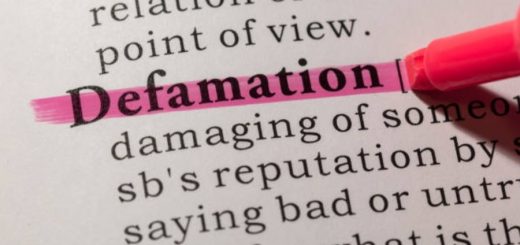‘Sentencing Stereotypes’? Racism in the Legal Profession in LSUC v McSween
In our first year torts class, our professor told us that those people who came to law school thinking that they were going to change the world had come to the wrong place. The law, by its nature, is a conservative institution. It follows social momentum, it doesn’t create it; it is complicit in the organization of the world, it doesn’t reorganize it.
Although maybe such an account paints too pessimistic a picture of people’s ability to harness the law to bring about social change, there’s some truth to the proposition that the law constitutes the status quo much more than transforms it. This was recently highlighted by a decision of a Law Society Appeal Panel (LSAP) in Law Society of Upper Canada v Selwyn Milan McSween, 2012 ONSLAP 3, which upheld findings of misconduct against a 65-year-old lawyer of Afro-Caribbean descent.
A noteworthy aspect of the decision was the dissent written by Clayton Ruby—a prominent criminal and constitutional lawyer who had previously represented Donald Marshall Jr. and fought against Canadian military policies that discriminated on the basis of sexual orientation—and Constance Backhouse—a Distinguished Professor at the University of Ottawa Faculty of Law, known for her writing on the legal history of race and gender in Canada.
The Majority’s Reasons—Lawyer as “Unknowing Dupe”
In 2008, the Law Society made a number of allegations of professional misconduct against McSween, namely, that (1) he knowingly assisted fraudulent or dishonest conduct in real estate transactions in relation to ten properties or, alternatively, that he failed to be on guard against fraud or dishonesty, or that he completely abdicated his professional responsibility; (2) he failed to be honest and candid with his lender clients on the transactions; (3) he failed to serve his lender clients to the standard of a competent lawyer; and (4) he acted for multiple parties with conflicting interests without providing adequate disclosure or obtaining consent. In the end, the Law Society revoked McSween’s license to practice law.
Before LSAP, McSween argued that while he had participated in ten fraudulent real estate transactions, he did so unwittingly. Unable to secure an articling position, circumstance led him to work with “an unscrupulous law clerk” who orchestrated the fraudulent transactions. The LSAP considered whether the hearing panel had, by interrupting McSween’s evidence 49 times, created a reasonable apprehension of bias. The majority concluded that while it would have been “preferable” if some of the interventions had been avoided, they fell “far short of establishing bias or unfairness or a reasonable apprehension of such.” The majority also dismissed McSween’s claim that the hearing panel made unreasonable findings of fact.
The LSAP agreed with McSween, however, that the hearing panel had failed to consider significant aspects of his defence and since “the appellant may well have been an unknowing dupe” in the transactions, the finding that he knowingly assisted in mortgage fraud could not stand. Although the majority permitted McSween to surrender his license rather than revoking it, it nonetheless found that his conduct could not be explained by his inability to find an appropriate mentor since “surely, a competent lawyer must, at a minimum, conduct himself or herself in a way so as to guard against becoming the tool or dupe of unscrupulous parties.”
The Dissent—Taking Notice of Systemic Discrimination
It was noteworthy that the majority accepted the hearing panel’s findings that while McSween did not become a lawyer to participate in mortgage fraud, “for whatever reasons,” he became involved. The dissent, in turn, picked up on just what those reasons could have been. The judgment begins with a particular framing of the facts: “Mr. McSween is a 65-year-old Canadian of Afro-Caribbean descent. He was born into extreme poverty in Trinidad and Tobago.”
The same “unknowing dupe” from the majority’s reasons was the recipient of a Master of Arts Degree (Gold Medal) from the University of Manitoba. He was an investigator with the Ontario Human Rights Commission and with the Pay Equity Commission of Ontario, he was a Director of Policy in History and Culture for the Government of Ontario. For “whatever reason,” however, when McSween applied for over 100 articling positions after studying law at the University of Western Ontario, he was unsuccessful in securing a position.
When he finally did find one, passed the bar, and applied for jobs at about 50 law firms, he once again could not secure a position. So, McSween began a career as a sole practitioner, hiring a clerk—a woman “with whom he shared Caribbean and Christian identity”—who had experience in real estate transactions. And so, the “unknowing dupe” could hardly be blamed for testifying that since he entered the legal profession, he has been “a person generally speaking who has had to tread water on his own.”
For the dissent, the flaw in the hearing panel’s approach was that it failed to give sufficient weight to the systemic disadvantage experienced by McSween “as a lawyer of Afro—Caribbean descent.” Consequently, it was not enough that the panel was “aware” of McSween’s background, such awareness “is not equivalent to giving appropriate weight to the context of being a lawyer from a racial minority in Canadian society and its connection to the misconduct.”
In reaching its decision, the dissent outlined the ways in which the judiciary takes notice of systemic racism. The doctrine of judicial notice was set out in R v Find, [2001] 1 SCR 863: it dispenses with the need for proof and cross-examination of facts that are beyond reasonable dispute. Ruby found that it applied to the facts of the case since “the existence of anti-black racism in Canadian society is not the subject of debate among reasonable people.” Citing R v Parks (1993), 15 OR (3d) 324 (CA), the dissent affirmed that “racism, and in particular anti-black racism, is part of our community’s psyche” and it is partly for this reason that a disproportionate number of black lawyers face allegations of professional misconduct.
As a result, systemic racism (together with age discrimination) constitutes a mitigating factor that should be taken into account in deciding appropriate discipline. Like the majority, however, the dissent concluded that the appropriate discipline was to affirm all of the findings of the hearing panel but to allow McSween to surrender his license, instead of having it revoked.
Analysis
The Articling Debate
The future of articling is a contentious topic both in law schools and in the legal profession. In 1999, the Working Group on Racial Equality in the Legal Profession of the Canadian Bar Association published a report which documented the divergent articling experiences of racialized and non-racialized law students—the former tended to have fewer opportunities to secure articling positions and even when such positions were secured, they did not have the same access to clients, senior lawyers, and important cases as the latter. In 2008, the Law Society pointed to a significant shortage of articling positions and the continuing disproportionate inability of “equity-seeking groups” to secure them.
The existing articling system aggravates not only inequalities between law students but also access to justice concerns, given the fact that articling positions are concentrated in big firms in big cities. On December 9, 2011, the Law Society released a consultation report offering a number of ways to address the current problems with articling. Like the reports that came before it, McSween should draw attention to the articling debate, questioning the sustainability of the existing model, and highlighting the pressing need for reform.
The Persisting Relevance of the Race Concept
The operation of systemic racism in the legal profession has (at least) two reinforcing features. First, equity-seeking groups experience greater difficulty in securing articling positions; in other words, they face more barriers trying to get their foot in the door. Second, equity-seeking groups are disproportionately more likely to be subject to disciplinary proceedings. This reality may be a factor of the first: fewer (and lower quality) articling opportunities result in inadequate training. It can also result, however, from the operation of racist stereotypes. In the United Kingdom, Ruby notes, firms whose lawyers were predominantly of African and Caribbean descent were six times more likely to be closed down.
The same statistics are not available in Ontario, since the Law Society does not record the race of disbarred lawyers, lawyers who are investigated for regulatory compliance, or lawyers charged with professional misconduct. This colour-blind approach, however, does not mean that the same racism is not operating but simply that its operation is rendered illegible. The decision in McSween highlights the need to recognize the continuing relevance of the race concept; if it is not tracked, recorded, and analyzed in its terms, we miss important dynamics about how the world operates to the benefit of some and to the exclusion of ‘Others.’
The Need to ‘Sentence Stereotypes’?
In reviewing the approach used by courts to assess the impact of race in the criminal justice system, Ruby emphasized that judges should not be expected to sentence stereotypes, or apply sentencing principles in a way entirely divorced from the individual circumstances of each case. The question that arises, however, is whether systemic discrimination could ever be meaningfully addressed without sentencing stereotypes? Or is systemic discrimination so deep-rooted that it can only be uprooted by a strategy that uses the law in an instrumental way—a way that transcends particular circumstances and resists the temptation to individualize blame?
Maybe we need to be critical of the assumptions we make in describing the redistributive potential of the law. For instance, the dissent found that individual punishment is appropriate, despite systemic racism, because of the need to protect the public. Is it appropriate to speak of a monolithic public in this context? Who is the “public” that is harmed by the actions of a lawyer like McSween? It’s people from the same community, sharing the same vulnerabilities. Are these people really better off when a lawyer like McSween has his license revoked? Or would they be better off if the reinstatement of his license could be made contingent on certain training requirements? Ruby writes that “we do not propose that a hearing panel should right social wrongs or ‘make up’ for societal injustices. Neither is within their power or mandate.”
But whose mandate is it then? To participate in a professional discipline hearing implicating race is to engage in politics; it is to confront the issue of the distribution of power in society head on. At this juncture, such panels can either rectify inequality or perpetuate the status quo. There may not be a right answer to this question, but we have to realize that neither is normatively neutral. Maybe the reality is that sometimes the law, on its own terms and at its own pace, fails to transform itself. It re-entrenches instead of redistributes. Maybe the only way to redistribute, then, is by sentencing stereotypes.







Join the conversation